- ICNA Educational Meetings
- Khartoum Educational Meeting Jan 27-31 2015
Khartoum Educational Meeting Jan 27-31 2015
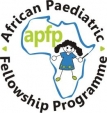 |
African Paediatric Fellowship Programme Department of Paediatrics and Child Health Red Cross Children’s Hospital, Klipfontein Road, 5th Floor, ICH Building, Rondebosch Tel: +27 (0) 21 685-5301 Fax: +27 (0) 21 689-1287 Website: http://www.scah.uct.ac.za/apfp/ |
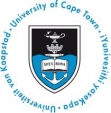 |
Team
Team
Jo Wilmshurst (ICNA, APFP director), Kirsty Donald (HOD neurodev, APFP)
ICNA team: Robert Rust, Pratibha Singhi, Charles Newton, recruited ICNA speakers: Patrick van Bogaert, Karen Skjei
Venue: Khartoum, Sudan
Day 1:
PET1 course: Soba University Teaching Hospital. Jo and Patrick observed a PET1 (paediatric epilepsy teaching course, level 1) teaching course. This course was coordinated by the faculty from the British Paediatric Neurology Association, but the core teaching was undertaken by trained doctors from Sudan, who had already completed the course and the "train the trainers" module. Some 60 doctors attended this one day course which took the clinicians through logical and safe approaches to entry level management of 'the child with epilepsy'. This course is a great way to lay the foundations for developing capacity to permit good primary and secondary level care for children with epilepsy. It is also a good template to facilitate development of a standardized approach which a region can adapt to ensure consistency in management for affected children. This teaching template has 2 further days taking the clinician through more focused epilepsy care according to the age range of the child i.e. infancy / early childhood (day 2) and childhood / adolescence (day 3). The organisers have adapted the course for resource poor settings.
After attending this course communications are underway to support the international extension of this project through resources in the ILAE and ICNA, as well as to explore the potential for further roll-outs in Africa through the APFP and ACNA.
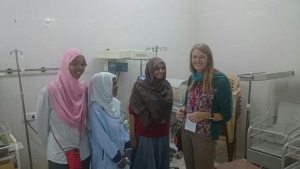 Prof. Wilmshurst with the doctors in the neonatal unit at Soba HospitalSoba Hospital: Dr Rashid Ellidir (ex-APFP accredited nephrology trainee) showed Jo around the Soba Hospital. This is a good teaching setting with a focused paediatric sections of about 300 beds. There are dedicated sub-disciplines supporting nephrology (covered in details in Dr Nourse's APFP report, from his visit in October 2014), oncology, neonatology, PICU, gastroenterology, and so on. Some services are providing more technical input than others, such as the nephrology dialysis service. Others are evolving, such as the neonatology unit. The hospital has great capacity for development and there is evidence that this is already underway. Relationships in training have already been formed with Uganda and a team of doctors and nurses are training in nephrology care as part of a training exchange to develop specific skills.
Prof. Wilmshurst with the doctors in the neonatal unit at Soba HospitalSoba Hospital: Dr Rashid Ellidir (ex-APFP accredited nephrology trainee) showed Jo around the Soba Hospital. This is a good teaching setting with a focused paediatric sections of about 300 beds. There are dedicated sub-disciplines supporting nephrology (covered in details in Dr Nourse's APFP report, from his visit in October 2014), oncology, neonatology, PICU, gastroenterology, and so on. Some services are providing more technical input than others, such as the nephrology dialysis service. Others are evolving, such as the neonatology unit. The hospital has great capacity for development and there is evidence that this is already underway. Relationships in training have already been formed with Uganda and a team of doctors and nurses are training in nephrology care as part of a training exchange to develop specific skills.
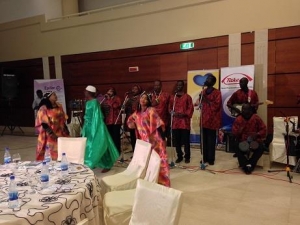 Sudanese traditional dancersDay 2: Start of the congress / welcoming ceremony. A very special trip on the Nil e during the day enabled meeting and networking with the students, local faculty and other invited speakers. The opening ceremony was truly a celebration of the paediatric faculty in Sudan which included presentations from the president of the Sudanese Association of Pediatricians (SAP) Prof El Amin, the president of the Sudan Medical Council Prof Karrar and a presentation from Prof Salih on behalf of Sudanese Pediatric Neurologists.
Sudanese traditional dancersDay 2: Start of the congress / welcoming ceremony. A very special trip on the Nil e during the day enabled meeting and networking with the students, local faculty and other invited speakers. The opening ceremony was truly a celebration of the paediatric faculty in Sudan which included presentations from the president of the Sudanese Association of Pediatricians (SAP) Prof El Amin, the president of the Sudan Medical Council Prof Karrar and a presentation from Prof Salih on behalf of Sudanese Pediatric Neurologists.
Days 3-4: Main congress – all ICNA / ACNA / APFP / ILAE speakers gave presentations. There were also presentations from Sudanese specialists and their colleagues who are now based in Saudi. It was reassuring the positive and supportive collaboration which was evident between those based in the 2 countries. Some superb presentations were delivered. In particular a review by Dr Badikir on 'traditional and spiritual medicine among Sudanese chi ldren with epilepsy' and another by Dr ElSeed on the 'Pediatric neurology service in Sudan: Current situation and future challenges' which illustrated the capacity to deliver care and the range of pathology seen in their setting with great clarity.
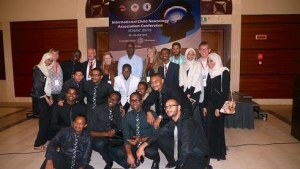 The afternoon workshop run with Dr Donald and a mixed Sudanese-UK based team regarding including developmental paediatricians and therapists. The objective of the workshop was highlighting the needs of children with Cerebral palsy in the African context as well as brainstorming ideas on how to introduce a more standardized and systematic approach to diagnostic and rehabilitation services for children with chronic neurodisability. The combination of expertise and insight into local conditions made this a very fruitful session and concrete plans were set in motion to start a service at the main teaching hospital within the next 12-24 months. Plans included financial commitment as well as training strategies.
The afternoon workshop run with Dr Donald and a mixed Sudanese-UK based team regarding including developmental paediatricians and therapists. The objective of the workshop was highlighting the needs of children with Cerebral palsy in the African context as well as brainstorming ideas on how to introduce a more standardized and systematic approach to diagnostic and rehabilitation services for children with chronic neurodisability. The combination of expertise and insight into local conditions made this a very fruitful session and concrete plans were set in motion to start a service at the main teaching hospital within the next 12-24 months. Plans included financial commitment as well as training strategies.
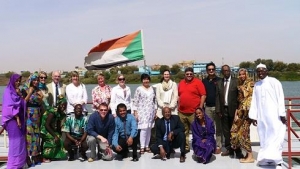 Prof Wilmshurst met with the president of the Sudanese Medical Council (Prof Karrar) and Chairman of the Paediatric and Child Health Council for the Sudan National Medical Specialization Board (Prof Mohamed Ahmed Abdullah). This was an excellent opportunity to discuss training potential and needs in the country. The Sudanese group are working on the development of strategic plans for the future training needs and optimal directions. The country definitely has capacity to establish their own sub-specialisation training with input for initially formal training in some key areas, which they should soon be able to take over on-site. This is be very important to reduce the brain drain - at the current time most of the undergraduates who are about to qualify are expecting to have to go overseas if they want to develop their careers. Establishing further training opportunities in Sudan will make it more likely that newly trained doctors will stay based in the country.
Prof Wilmshurst met with the president of the Sudanese Medical Council (Prof Karrar) and Chairman of the Paediatric and Child Health Council for the Sudan National Medical Specialization Board (Prof Mohamed Ahmed Abdullah). This was an excellent opportunity to discuss training potential and needs in the country. The Sudanese group are working on the development of strategic plans for the future training needs and optimal directions. The country definitely has capacity to establish their own sub-specialisation training with input for initially formal training in some key areas, which they should soon be able to take over on-site. This is be very important to reduce the brain drain - at the current time most of the undergraduates who are about to qualify are expecting to have to go overseas if they want to develop their careers. Establishing further training opportunities in Sudan will make it more likely that newly trained doctors will stay based in the country.
Day 5: Visit to the pyramids – amazing!
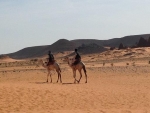 |
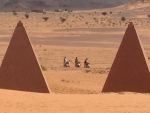 |
 |
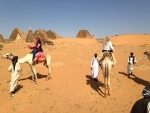 |
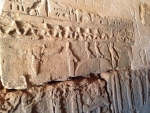 |
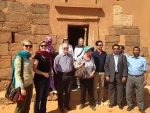 |
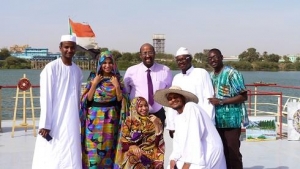 For the APFP: This was an excellen t trip to understand the health care needs of the region and the capacity to deliver care. To meet with major stakeholders and to understand the potential for collaboration with this country. The main stakeholders will compile a strategic plan which will address training needs across various areas and will explore collaborations with other areas of health such as nursing and ancillary services. They will investigate the funding support locally so that it can be established whether the trainee could be fully funded, part or self funded.
For the APFP: This was an excellen t trip to understand the health care needs of the region and the capacity to deliver care. To meet with major stakeholders and to understand the potential for collaboration with this country. The main stakeholders will compile a strategic plan which will address training needs across various areas and will explore collaborations with other areas of health such as nursing and ancillary services. They will investigate the funding support locally so that it can be established whether the trainee could be fully funded, part or self funded.
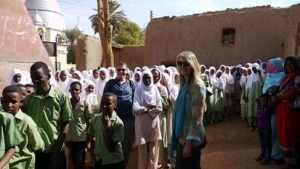 For the ICNA: the meeting was a great opportunity to develop relationships with a dynamic country in Africa, to recruit members to the association (since the meeting a further 3 doctors working in child neurology have joined – previously there was one from the country). The attendance at the meeting was great with some 250 doctors attending, all of whom practiced in and had an interest in child neurology. Based on this, this format of sending a few members from the ICNA (and allied associations) to present at these meetings is an effective way to target large groups of motivated health practitioners. A special thank you goes out to Prof Babikir who was behind much of the meeting and ensuring that we were looked after so well. He and his colleagues have been asked to submit a report on the health care in Sudan for childhood neurological disorders.
For the ICNA: the meeting was a great opportunity to develop relationships with a dynamic country in Africa, to recruit members to the association (since the meeting a further 3 doctors working in child neurology have joined – previously there was one from the country). The attendance at the meeting was great with some 250 doctors attending, all of whom practiced in and had an interest in child neurology. Based on this, this format of sending a few members from the ICNA (and allied associations) to present at these meetings is an effective way to target large groups of motivated health practitioners. A special thank you goes out to Prof Babikir who was behind much of the meeting and ensuring that we were looked after so well. He and his colleagues have been asked to submit a report on the health care in Sudan for childhood neurological disorders.
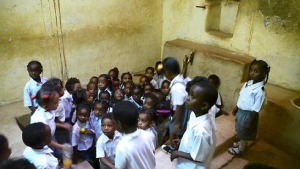 For the ILAE: Attending, observing and talking through with Philippa Roddie how the PET courses operate was a really useful exercise. This system of communicating information would form a really good way to lay the foundations for promoting good and consistent epilepsy care and to open the way to introducing the guidelines at a local level.The meeting was supported in part by an amazing NGO – headed by Nazim who was a fount of information and deeply committed to promoting better health care for Sudan.
For the ILAE: Attending, observing and talking through with Philippa Roddie how the PET courses operate was a really useful exercise. This system of communicating information would form a really good way to lay the foundations for promoting good and consistent epilepsy care and to open the way to introducing the guidelines at a local level.The meeting was supported in part by an amazing NGO – headed by Nazim who was a fount of information and deeply committed to promoting better health care for Sudan.
Add comment